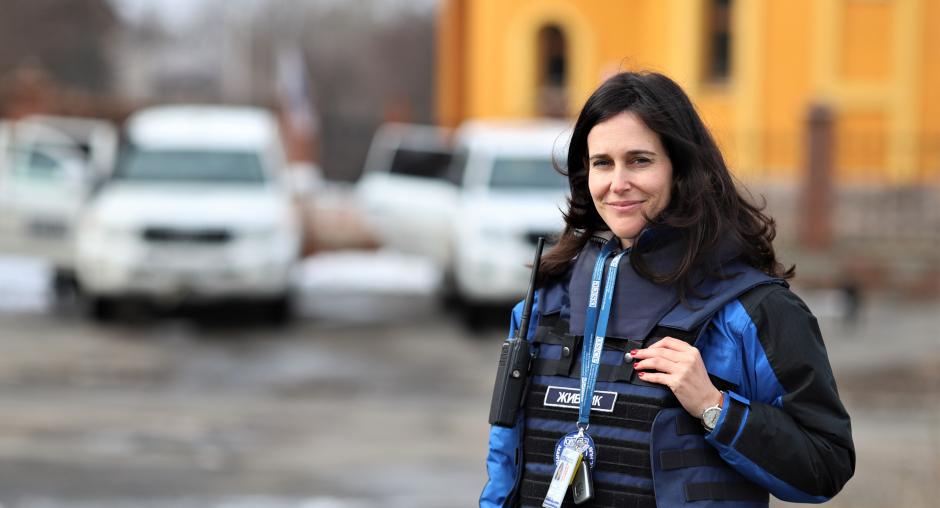The Face of Conflict
Jennifer Langlais, an SMM monitoring officer based in Donetsk city, is many things. A Harvard and Oxford graduate and a human rights advocate with work experience in places as diverse as Gambia and Nepal to name but two. But speak to her for an hour and one thing is patently obvious: she's both a listener and story teller.
“I like to interact with people and to understand the conflict through their perspective,” says Jennifer. “I like to collect their stories as those stories can move people perhaps more than reports.”
Those stories sometimes make for grim listening and reading. She recalls monitoring in Donetsk city’s Kyivskyi district, where an SMM patrol she led met a woman in her sixties whose home had been destroyed in the fighting over the nearby airport. Faced with travel expenses amounting to half their pension entitlements, neither she nor her husband were crossing the contact line to collect their pensions, forcing them instead to live on financial handouts from aid organizations and others. “It's not uncommon,” Jennifer explains. “Relative to what they could receive, the costs are enormous, and people of pension age are the least able to make the sometimes arduous journey.”
After three years of working on the contact line, in the middle of a conflict that has spawned numerous often-competing narratives, Jennifer is sure of one thing. “When you listen to people, really listen to them, it’s obvious, even if the space they share is divided, that they share a similar reality,” she says.
To illustrate her point she recounts the story of another elderly woman she met in Nevelske. Although only some 15 kilometres west of Kyivskyi district, the woman told Jennifer and the other SMM monitoring officers that the fields separating them are laden with mines, booby traps and unexploded ordnance, making them dangerous if not impossible to cultivate. She told of a village slowly dying with only about 10 percent of its pre-conflict population remaining, almost all of them over the age of sixty and the majority, women. “It’s quite shocking,” Jennifer explains. “Many residents have died alone in their houses since 2014, somehow left behind as the young have fled the violence and accompanying economic deterioration, or simply have been brought to the grave by years of conflict.”
Jennifer’s intention though is not to shock. “If this conflict is to end, we have to listen to one another,” she says. “The stories we tell are difficult and often heart-breaking but they are necessary for understanding and meaningful dialogue.” With access to areas not controlled by the government restricted to most other international organizations, Jennifer feels a heavy responsibility to tell those stories. “If we in the SMM don’t do it, who will?” she asks.
It is the stories of the elderly, especially of elderly women in places like Kyivskyi district and Nevelske on the contact line, that Jennifer in particular wants the world to hear. “The face of this conflict is the face of an elderly woman,” she says. “Her story must be told.”

